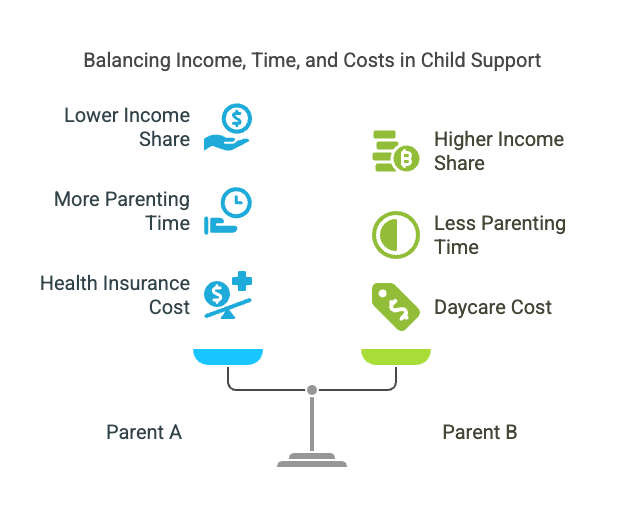
Going through a separation is tough, there’s no way around it. And when you have kids, a whole new layer of questions and worries pops up, especially about finances. One of the biggest sources of stress we see from our clients is the uncertainty around child support. It’s completely normal to feel overwhelmed, wondering, “How is this all decided? Will my kids be okay?”
At Jones Law Firm, PC, we believe knowledge is power. When you understand how the system works, you can take back a sense of control. So, let’s pull back the curtain on the child support guidelines in Colorado. This isn’t about random numbers pulled from thin air; it’s a structured formula designed to make sure children get the financial support they need.
In this guide, we’re not just going to give you a dry legal summary. We’re going to walk you through how we, as your attorneys, approach these calculations, what we look for, and how we advocate for a fair outcome for you and your family.
So, What’s the Big Idea? Colorado’s “Income Shares Model”
First things first, Colorado uses a system called the “Income Shares Model.” The philosophy behind it is pretty simple and fair: children should receive the same proportion of their parents’ income as they would have if the parents had stayed together. The court’s job is to create a financial safety net that reflects that principle.
This entire framework is laid out in the Colorado Revised Statutes §14-10-115. Think of this statute as the official rulebook. It provides the worksheets and guidelines that everyone in the legal system—from lawyers to judges—has to follow. When we take on a case, this statute is our map. Our job is to make sure every single piece of information put into that map is accurate, verified, and tells the true story of your financial situation.
Factors Affecting Child Support
While the state offers a calculator, it’s a classic case of “garbage in, garbage out.” The final number is only as good as the information you provide. This is precisely where having an experienced family law attorney can make all the difference. We don’t just type in numbers; we dig in, ask the right questions, and make sure the full picture is represented.
Here are the main factors affecting child support and a little insight into how we handle them for our clients.
1. Each Parent’s Gross Monthly Income
This is the big one—the foundation of the whole calculation. But “gross income” can be a lot more than just what’s on a pay stub. It’s our job to work with clients to identify every relevant source.
This can include:
* Salaries, wages, tips, and commissions
* Bonuses and overtime (often a point of disagreement!)
* Income from self-employment or a small business
* Rental income from properties
* Interest and dividends from investments
* Social Security or disability benefits
How We Help: Honestly, this is where things can get tricky. What if you’re a freelance graphic designer with fluctuating income? Or a salesperson whose pay is 50% commission? We’ve seen it all. We help our clients by meticulously reviewing financial records, profit-and-loss statements, and past tax returns to build a clear and defensible income report. We also know how to address situations where one parent might be intentionally earning less than they could. In those cases, we can argue for the court to use an “imputed income” based on their skills and job history.
2. The Number of Overnights with Each Parent
Parenting time isn’t just about the schedule; it directly impacts the financial calculation. The formula adjusts the support amount based on how many nights per year the child sleeps at each parent’s home. There are two different worksheets for this:
- Worksheet A: For when one parent has the child for fewer than 93 overnights a year.
- Worksheet B: For “shared physical care,” used when each parent has the child for 93 overnights or more.
How We Help: It’s so important that the parenting plan is stable and clear before calculating support. We work with our clients to establish a schedule that is in the child’s best interest and then ensure that agreed-upon schedule is what’s used for the official calculation. We make sure there’s no ambiguity that could be used to unfairly skew the numbers later.
3. The “Add-Ons”: Health Insurance, Childcare, and Other Big Costs
The formula doesn’t stop at basic needs. It also accounts for major, child-related expenses. These costs are typically added on top of the basic support obligation and then split between the parents based on their share of the income.
These include:
* The monthly premium for the child’s portion of a health insurance plan.
* Childcare costs that a parent needs to pay in order to work.
* Extraordinary medical expenses (think braces, therapy, or special treatments).
* Sometimes, major educational or extracurricular fees, if both parents agree or the court orders it.
How We Help: We’ve seen clients leave a lot of money on the table by overlooking these details. A common mistake is not correctly calculating the child’s portion of a family health plan. It’s not the whole premium! We guide our clients through gathering the right documentation—receipts for daycare, invoices for medical care—to ensure every legitimate cost is included and you get the credit you deserve.
Let’s See It in Action: How Payments Are Calculated
Okay, let’s try to make this real with a simplified example. Please remember, this is just an illustration to show the process. It is not legal advice, and your situation will be unique.
Imagine this scenario:
* Parent A: Earns a gross monthly income of $4,000. The children are with them 265 nights a year. They pay $200/month for the kids’ health insurance.
* Parent B: Earns a gross monthly income of $6,000. The children are with them 100 nights a year. They pay $500/month for work-related daycare.
Our process would look something like this:
- Combine Incomes: We start with the total pot. $4,000 + $6,000 = $10,000 combined gross monthly income.
- Find the Basic Obligation: We consult the official Colorado guideline chart. For two children with a combined $10,000 income, the basic support obligation is about $2,136 per month.
- Figure Out Proportions: Parent A earns 40% of the total income ($4k of $10k), and Parent B earns 60% ($6k of $10k).
- Add the Extra Costs: We add the health insurance ($200) and daycare ($500) to the basic amount: $2,136 + $700 = a total shared obligation of $2,836.
- Adjust for Parenting Time: Since Parent B has the kids for more than 92 nights, we’d use Worksheet B, which applies a special multiplier to account for the costs they handle during their time. This lowers the final payment.
- Credit Where Credit Is Due: The formula gives parents credit for the direct costs they cover. Parent A gets credit for the $200 insurance payment, and Parent B gets credit for the $500 daycare payment.

After all these adjustments, the math reveals the final transfer payment. In this case, Parent B, having the higher income, would be the one paying support to Parent A. This is the kind of modeling we do for our clients to give them a realistic expectation of the financial outcome.
What if Life Changes? Child Support Modification in Colorado
A court order for child support isn’t set in stone forever. Life happens! The law gets this, which is why you can request a child support modification in Colorado.
To do this, you generally need to show a “substantial and continuing change” in circumstances. What does that mean? In simple terms, it means a change big enough to alter the current child support amount by 10% or more.
Common reasons we help clients file for a modification include:
* An involuntary job loss or a major promotion for either parent.
* A significant and permanent change in the parenting time schedule.
* The child’s needs change (for example, a new medical diagnosis).
* The end of a major expense, like when a child becomes old enough to no longer need daycare.
How We Help: If your financial situation has changed, the first thing we do is run the numbers with the new information. If the calculation shows a change of 10% or more, we can move forward. We’ll help you file the official Motion to Modify, assemble all the proof needed (like termination letters or new pay stubs), and build a strong case for a new, fairer support order.

Common Questions We Hear All the Time
- When does child support end in Colorado? Typically, the obligation ends when a child turns 19. The two main exceptions are if the child is still in high school (or a similar program), in which case it continues, or if the child has a physical or mental disability that prevents them from being self-sufficient.
- Is there a minimum child support amount? Yes. For very low-income parents, the state has a specific chart to calculate a fair amount. Even for parents with little to no income, a minimum order (often around $50-$150) is usually set to establish the principle of support.
- What about college? Does the court order that? A judge cannot force parents to pay for college expenses. However, parents can—and often do—voluntarily agree to contribute to higher education. We can help you negotiate these terms and make them a binding part of your official court orders, giving you and your child peace of mind for the future.
Your Next Step: From Understanding to Taking Action
Getting a handle on the calculating child support payments process is a great first step. But as you can see, the formula is just the beginning. The real work—and where we can truly help—is in the details: making persuasive arguments about income, ensuring all expenses are counted, and advocating for a parenting plan that is reflected accurately in the final numbers.
If you’re facing a divorce or need to establish or modify a child support order here in the Denver area, please know you don’t have to figure all this out on your own. The team at Jones Law Firm, PC, is here to bring clarity to the confusion, protect your rights, and ensure your children’s financial future is secure.
Give us a call today at (303) 952-4582 or fill out our online contact form to schedule a consultation. Let’s talk about how we can help.
(This article is for informational purposes only and does not establish an attorney-client relationship. For advice tailored to your unique situation, speak directly with our legal team.)